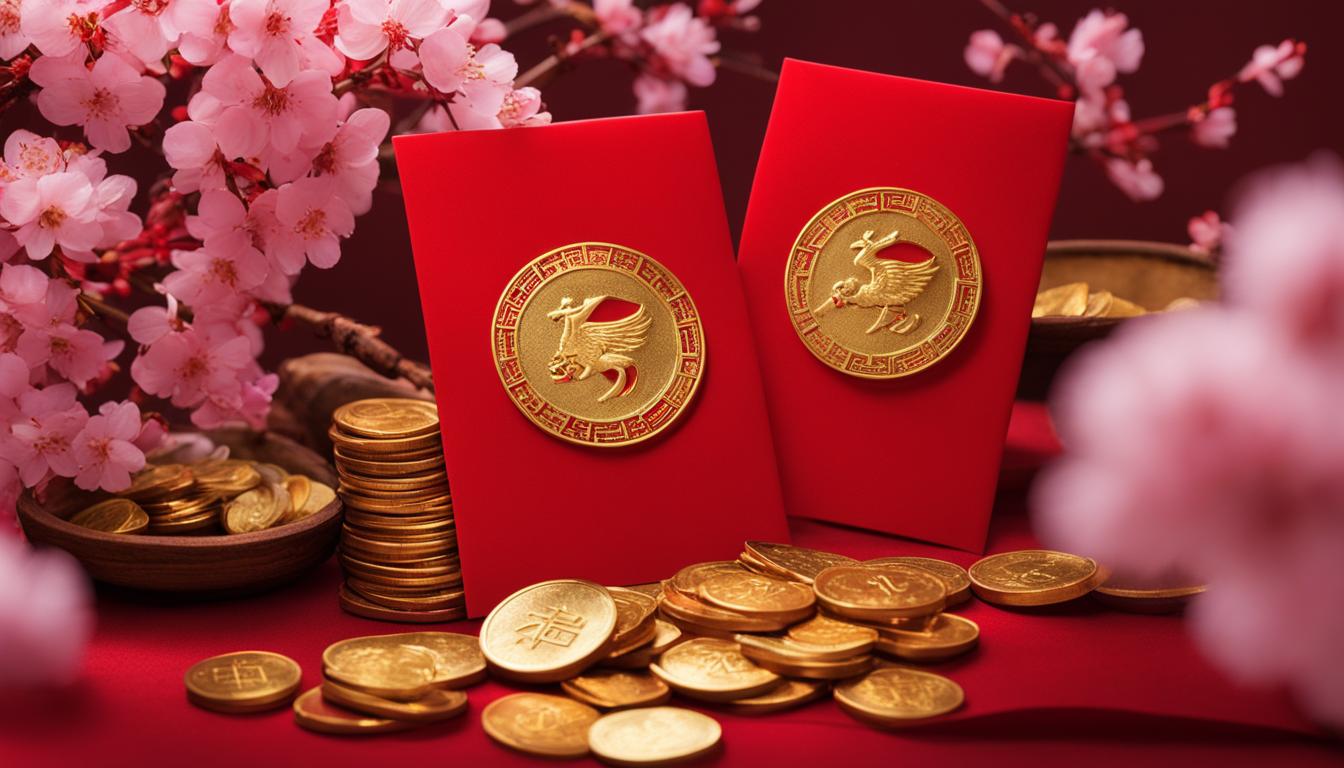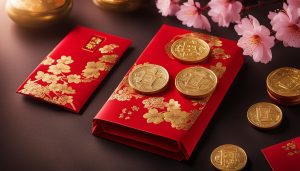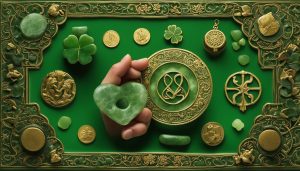Giving Chinese gifts is deeply rooted in the Chinese culture and plays a significant role in demonstrating respect and maintaining strong relationships. Understanding the art of giving gifts in Chinese culture is essential for anyone looking to navigate the customs and traditions associated with gift-giving. It is important to take into account the cultural significance of good luck gifts and the superstitions surrounding certain objects.
Contents
- 1 The Dos and Don’ts of Giving in Chinese Culture
- 2 Traditional Chinese Lucky Gifts
- 3 Occasions for Giving Good Luck Gifts in Chinese Culture
- 4 Chinese Gift Giving Etiquette
- 5 Chinese Gift Giving Superstitions and Symbols
- 6 Cultural Significance of Good Luck Gifts
- 7 Conclusion
- 8 FAQ
- 8.1 What is the cultural significance of good luck gifts in Chinese culture?
- 8.2 What are some traditional Chinese lucky gifts?
- 8.3 What are some gift taboos in Chinese culture?
- 8.4 What occasions call for giving good luck gifts in Chinese culture?
- 8.5 What is the gift-giving etiquette in Chinese culture?
- 8.6 What are some Chinese gift-giving superstitions and symbols?
- 8.7 How important are good luck gifts in Chinese society?
- 9 Source Links
Key Takeaways:
- Good luck gifts hold cultural significance in Chinese society and symbolize luck, prosperity, and blessings.
- Traditional Chinese lucky gifts include items like red envelopes, jade jewelry, Feng Shui items, and auspicious symbols.
- Be mindful of gift taboos such as avoiding sharp objects, the number 4, shoes, handkerchiefs, clocks, pears, and chrysanthemums.
- Chinese gift-giving etiquette includes using both hands to give and receive gifts and wrapping them in auspicious colors.
- Understanding Chinese gift-giving superstitions and symbols can help in selecting appropriate gifts.
The Dos and Don’ts of Giving in Chinese Culture
In Chinese culture, understanding the dos and don’ts of gift-giving is crucial to navigating the customs and traditions associated with it. When it comes to traditional Chinese good luck gifts, there are certain taboos that should be avoided. It is important to be aware of these cultural sensitivities to ensure your gift is well-received and meaningful.
Chinese Gift Taboos
When selecting a gift for someone in Chinese culture, it is important to avoid certain items that are considered taboo. Sharp objects such as knives and scissors symbolize severing a relationship, and should be avoided as a gift. Similarly, the number 4 is considered unlucky because it sounds similar to the word for death. Gifts such as clocks, pears, and chrysanthemums are also associated with bad luck and should be avoided. Additionally, shoes and handkerchiefs are believed to bring negative connotations and should not be given as gifts.
Traditional Chinese Lucky Gifts
On the other hand, there are traditional Chinese good luck gifts that are believed to bring luck and prosperity. Red packets, also known as red envelopes, are a popular gift during special occasions such as Chinese New Year. These envelopes are filled with money and are believed to bring good fortune to the recipient. Jade jewelry is another traditional Chinese lucky gift, as it is considered a symbol of luck and protection. Other auspicious symbols like the Double Happiness character and the Fu symbol are also commonly given as gifts, as they are believed to bring good luck.
| Gift Taboos | Lucky Gifts |
|---|---|
| Sharp objects (knives, scissors) | Red packets |
| Number 4 | Jade jewelry |
| Clocks | Auspicious symbols (Double Happiness, Fu symbol) |
| Pears | |
| Chrysanthemums | |
| Shoes | |
| Handkerchiefs |
By understanding the dos and don’ts of gift-giving in Chinese culture, you can ensure that your gift carries the appropriate meaning and shows respect for the customs and traditions of the culture.
Traditional Chinese Lucky Gifts
In Chinese culture, traditional lucky gifts hold great significance and are often exchanged on special occasions to bring good fortune and blessings. These gifts are deeply rooted in the beliefs and superstitions of Chinese culture and are chosen carefully to symbolize luck, prosperity, and protection.
Auspicious Symbols
One of the most popular traditional Chinese lucky gifts is the Double Happiness character. This symbol represents marital bliss and is often given as a wedding gift to bring luck and happiness to the couple. Another auspicious symbol is the Fu symbol, which stands for good luck and prosperity. It is commonly displayed during Chinese New Year celebrations and is believed to bring blessings for the year ahead.
Jade Jewelry
Jade is considered a precious stone in Chinese culture and is believed to bring good luck and protection. Jade jewelry, such as bracelets, necklaces, and pendants, is often given as a gift to bring fortune and ward off negative energy. The smooth and cool texture of jade is also associated with calmness and harmony, making it a cherished gift.
Red Packets
Red packets, also known as red envelopes, are a traditional Chinese gift often given during Chinese New Year and other special occasions. These packets are filled with money and are believed to bring good luck and prosperity. The color red is considered auspicious in Chinese culture and is believed to ward off evil spirits. Giving red packets symbolizes sharing good fortune and blessings with others.
| Traditional Chinese Lucky Gifts | Cultural Significance |
|---|---|
| Double Happiness symbol | Represents marital bliss and brings luck and happiness |
| Fu symbol | Brings good luck and prosperity |
| Jade jewelry | Brings luck, protection, and harmony |
| Red packets | Symbolizes sharing good fortune and brings prosperity |
These traditional Chinese lucky gifts are chosen with care and given with the intention of bringing good luck, happiness, and blessings to the recipient. They not only showcase an understanding and appreciation for Chinese culture but also strengthen relationships and foster positive energy and harmony.
Occasions for Giving Good Luck Gifts in Chinese Culture
In Chinese culture, gift-giving is a cherished tradition that carries deep cultural significance. Good luck gifts are given on various occasions to bring blessings, prosperity, and positive energy to the recipient. Understanding these occasions and choosing appropriate traditional Chinese lucky gifts is essential for maintaining strong relationships and showing respect.
One of the most significant occasions for giving good luck gifts in Chinese culture is Chinese New Year. This is a time when families gather to celebrate and welcome the upcoming year with joy and good fortune. Chinese New Year gifts, such as red envelopes filled with money, are exchanged between family members and friends to bring prosperity and luck for the year ahead.
Aside from Chinese New Year, there are other occasions throughout the year when good luck gifts are appropriate. Birthdays are a special time to show love and blessings to the birthday person. Traditional Chinese lucky gifts, such as red packets or jade jewelry, are often given to symbolize good luck and longevity. Weddings are another occasion where good luck gifts are commonly exchanged. Couples often receive gifts that represent blessings for a harmonious and prosperous marriage.
Housewarmings and visits to friends and family are also occasions where good luck gifts are welcomed. Traditional Chinese lucky gifts such as Feng Shui items, auspicious symbols, or items believed to bring luck and prosperity are popular choices. These gifts convey good wishes and a desire for happiness and success in the recipient’s home and life.
| Occasions for Giving Good Luck Gifts | Traditional Chinese Lucky Gifts |
|---|---|
| Chinese New Year | Red envelopes (red packets), jade jewelry |
| Birthdays | Red packets, jade jewelry |
| Weddings | Auspicious symbols, Feng Shui items |
| Housewarmings and visits | Feng Shui items, auspicious symbols |
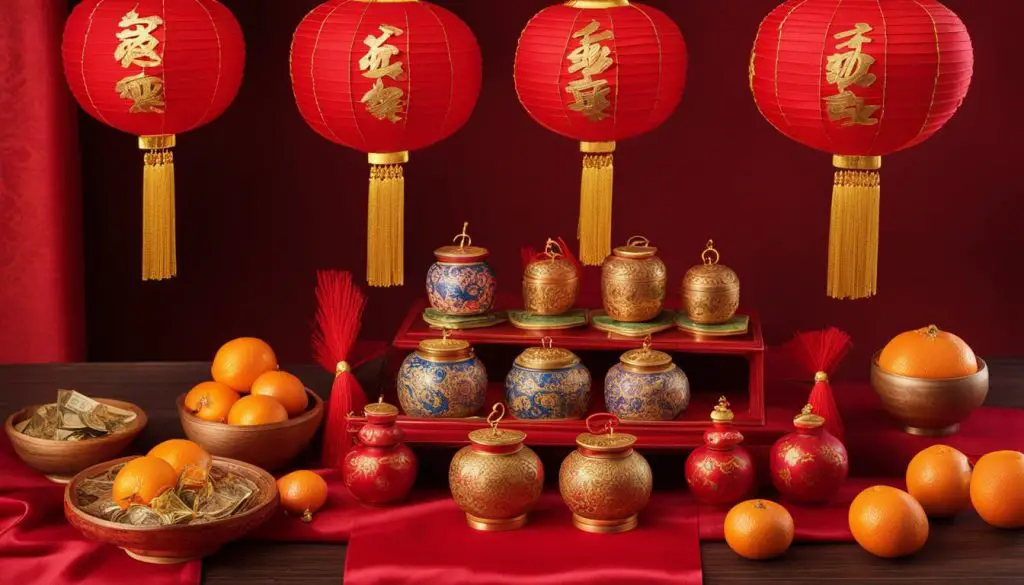
By giving good luck gifts on these occasions, you not only honor the customs and traditions of Chinese culture but also convey your well wishes for luck, prosperity, and happiness. These gifts are a tangible expression of your respect and the importance you place on the relationship with the recipient. So, whether it’s Chinese New Year, a birthday, a wedding, or a housewarming, consider giving a traditional Chinese lucky gift to show your care and bring good fortune to the recipient.
Chinese Gift Giving Etiquette
Understanding proper gift-giving etiquette is essential when navigating the customs and traditions of Chinese culture. Chinese gift-giving culture places great emphasis on respect and maintaining relationships, and following the appropriate etiquette is key to showing your appreciation and understanding. Here are some important guidelines to keep in mind:
Using Both Hands
When presenting a gift in Chinese culture, it is customary to use both hands to show respect and sincerity. This simple gesture demonstrates your appreciation and the significance you place on the act of giving.
Carefully Wrapped Gifts
The presentation of the gift is just as important as the gift itself. It is customary to wrap gifts neatly and considerately, preferably in auspicious colors such as red or gold. The wrapping should be done with care, reflecting the thought and effort put into the gesture.
| Chinese Gift Giving Etiquette |
|---|
| Use both hands when presenting a gift |
| Wrap gifts carefully and considerately |
| Avoid overly expensive gifts |
| Refusing a gift before accepting it is polite |
| Reciprocate the gesture to maintain the relationship |
Avoiding Overly Expensive Gifts
In Chinese culture, it is important to avoid giving overly expensive gifts, as this may be perceived as a form of bribery or imposing a burden on the recipient. Instead, focus on choosing meaningful gifts that reflect the relationship and occasion.
Refusing and Reciprocating
When receiving a gift in Chinese culture, it is customary to initially refuse the gift out of politeness. This allows the giver to demonstrate their sincerity and insistence. After the initial refusal, it is acceptable to accept the gift graciously. Additionally, it is customary to reciprocate the gesture in the future by giving a gift of similar value, thus maintaining the relationship.
“Gift-giving in Chinese culture is an art that revolves around respect, sincerity, and maintaining strong relationships. Following the proper etiquette is not only a sign of appreciation but also a way to show your understanding and respect for Chinese customs and traditions.”
By understanding and following Chinese gift-giving etiquette, you can navigate the cultural intricacies and make meaningful connections when presenting gifts in Chinese culture. Remember to use both hands, wrap gifts carefully, avoid overly expensive gifts, and reciprocate the gesture in the future. These small actions will go a long way in showing your respect and appreciation for Chinese customs.
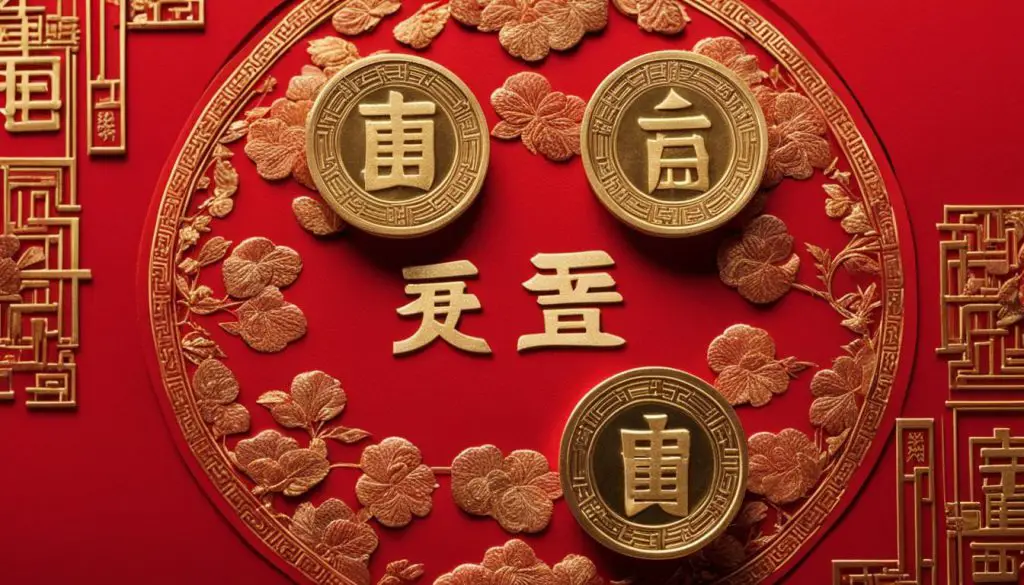
Chinese Gift Giving Superstitions and Symbols
In Chinese culture, there are numerous superstitions and symbols associated with gift-giving. These beliefs play a significant role in the selection of traditional Chinese lucky gifts. Understanding these superstitions and symbols can help you choose appropriate gifts that convey good luck and blessings.
Lucky Symbols:
Chinese culture is rich in lucky symbols that are believed to bring good fortune. Some popular symbols include:
- The Double Happiness character: This symbol represents harmony, love, and good luck in relationships.
- The Fu symbol: This character signifies blessings, happiness, and prosperity.
- The Chinese dragon: A symbol of power, strength, and good luck, the dragon is revered in Chinese culture.
Superstitions:
Chinese superstitions also influence gift-giving practices. Here are some examples:
- The number 4: In Chinese culture, the number 4 is considered unlucky because its pronunciation is similar to the word for death. Therefore, gifts should not include anything relating to the number 4, such as four items or an amount of money with a 4 in it.
- Colors: Red is considered lucky and represents joy and celebration, making it an auspicious color for gift wrapping. On the other hand, white is associated with mourning and should be avoided.
Lucky Charms:
Chinese lucky charms are commonly given as gifts to bring good luck and ward off negative energy. Some popular lucky charms include:
- Red envelopes (red packets): These are filled with money and given on special occasions like Chinese New Year to bring good fortune.
- Jade jewelry: Jade is believed to bring luck, protection, and positive energy.
- Feng Shui items: These include objects like Chinese dragon statues or money trees, which are thought to attract prosperity and positive energy.
By understanding these superstitions and symbols, you can choose traditional Chinese lucky gifts that hold cultural significance and convey your best wishes for luck and blessings.
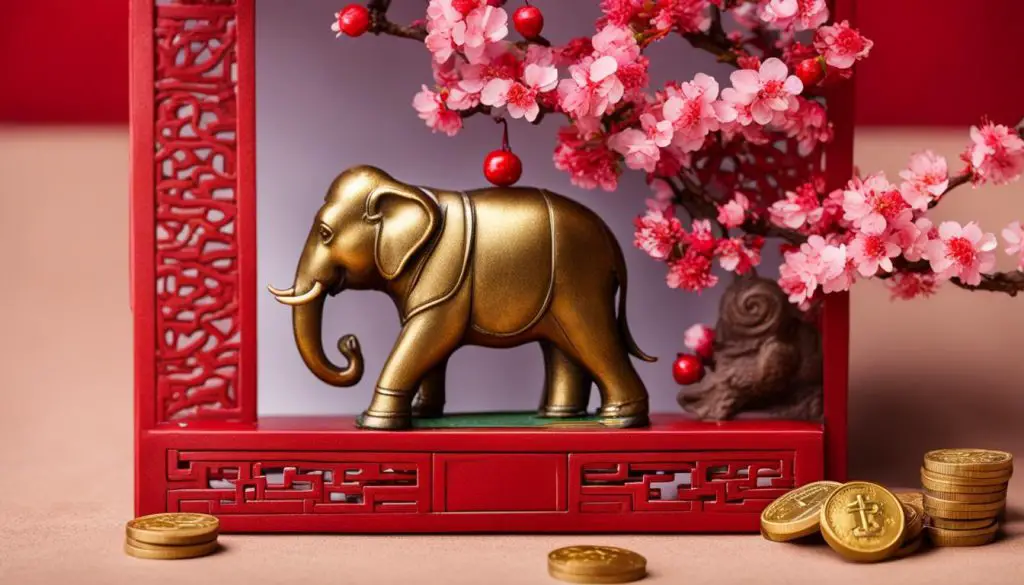
Cultural Significance of Good Luck Gifts
Good luck gifts have deep cultural significance in Chinese society. They are not merely presents but expressions of respect, well wishes, and the desire for prosperity. Traditional Chinese lucky gifts are carefully chosen to symbolize luck, harmony, and blessings for the recipient. Understanding the cultural importance of these gifts is essential when navigating the customs and traditions of Chinese culture.
Chinese culture places great emphasis on the concept of luck and superstitions. Good luck gifts are believed to bring positive energy, fortune, and protection to the recipient. They serve as a way to show appreciation, strengthen relationships, and express good intentions. By giving traditional Chinese lucky gifts, you demonstrate an understanding and appreciation for the customs and traditions that are deeply rooted in Chinese culture.
Traditional Chinese lucky gifts come in various forms, each with its own symbolic meaning. Red envelopes, also known as red packets, are commonly given during special occasions like Chinese New Year to bring good fortune and wealth. Jade jewelry is considered a powerful talisman, representing luck, purity, and protection. Feng Shui items, such as a Chinese dragon statue or a money tree, are believed to attract positive energy and prosperity. Auspicious symbols like the Double Happiness character and the Fu symbol are also popular choices for good luck gifts, representing joy, prosperity, and good luck.
| Traditional Chinese Lucky Gifts | Symbolic Meaning |
|---|---|
| Red Envelopes (Red Packets) | Good fortune and wealth |
| Jade Jewelry | Luck, purity, and protection |
| Feng Shui Items | Positive energy and prosperity |
| Auspicious Symbols (Double Happiness, Fu) | Joy, prosperity, and good luck |
By understanding the cultural significance of good luck gifts in Chinese culture, you can participate in the traditions and customs associated with gift-giving. These gifts go beyond material value and hold a deep meaning that fosters strong relationships and mutual respect. Whether it’s a red envelope filled with money, a piece of jade jewelry, or a Feng Shui item, the act of giving a traditional Chinese lucky gift shows your sincerity, thoughtfulness, and appreciation for the rich traditions of Chinese culture.
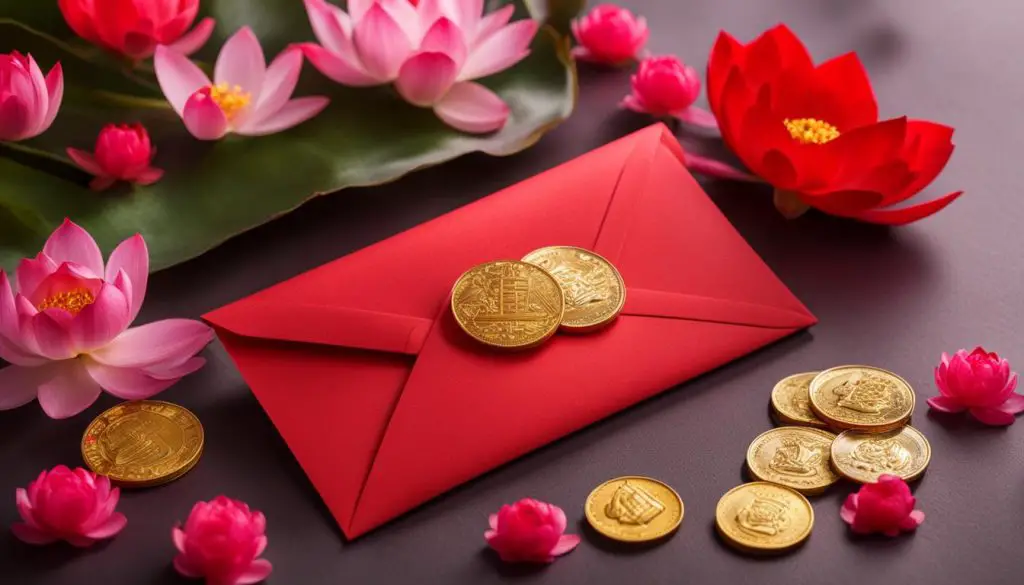
Conclusion
Understanding what constitutes a good luck gift in Chinese culture is crucial to navigating the customs and traditions associated with gift-giving. The cultural significance of these gifts goes beyond mere material value, as they play an essential role in showing respect, maintaining relationships, and wishing good fortune to the recipient.
In Chinese culture, luck and superstitions hold great sway. By avoiding gift taboos and selecting appropriate traditional Chinese lucky gifts, you demonstrate your respect and appreciation for Chinese customs. These gifts, such as red envelopes, jade jewelry, Feng Shui items, and auspicious symbols, are believed to bring luck and prosperity.
Chinese gift-giving culture emphasizes etiquette, and it is important to follow certain guidelines. When giving a gift, present it with both hands to show respect. Take care to wrap it beautifully, preferably in auspicious colors like red. And remember, it is customary to initially refuse a gift before accepting it. Reciprocating the gesture in the future is also a way to maintain relationships.
By delving into the world of Chinese culture and familiarizing yourself with its traditions and superstitions, you can successfully navigate the art of gift-giving. Show your understanding and appreciation for Chinese customs by choosing the right traditional Chinese lucky gifts, and you will bring luck, blessings, and happiness to those you care about.
FAQ
What is the cultural significance of good luck gifts in Chinese culture?
Good luck gifts in Chinese culture hold a significant cultural significance. They are a way of showing respect, maintaining relationships, and wishing good fortune to the recipient. These gifts often symbolize luck, prosperity, and blessings.
What are some traditional Chinese lucky gifts?
Traditional Chinese lucky gifts include items such as red envelopes (red packets), jade jewelry, Feng Shui items, and auspicious symbols. Red envelopes filled with money are often given during special occasions like Chinese New Year to bring good fortune. Jade is considered a symbol of luck and protection in Chinese culture. Feng Shui items, such as a Chinese dragon statue or a money tree, are believed to bring positive energy and luck. Auspicious symbols like the Double Happiness character or the Fu symbol are also popular choices for good luck gifts.
What are some gift taboos in Chinese culture?
In Chinese culture, there are certain gift taboos that should be avoided. Sharp objects, such as knives and scissors, symbolize severing a relationship. The number 4 is considered unlucky as it sounds similar to the word for death. Shoes and handkerchiefs are associated with negative connotations and should be avoided. Clocks, pears, and chrysanthemums are also considered bad luck gifts.
What occasions call for giving good luck gifts in Chinese culture?
Good luck gifts are given on various occasions in Chinese culture. Chinese New Year is a significant event when gifts are exchanged to bring good fortune for the upcoming year. Other occasions include birthdays, weddings, housewarmings, and visits to friends and family. It is important to consider the cultural significance of these occasions and choose appropriate traditional Chinese lucky gifts that symbolize luck and prosperity.
What is the gift-giving etiquette in Chinese culture?
Chinese gift-giving etiquette is an important aspect of Chinese culture. When giving a gift, it is customary to use both hands to show respect. The gift should be carefully wrapped, preferably in red or auspicious colors. It is also common to give gifts in pairs or multiples of lucky numbers. When receiving a gift, it is polite to initially refuse it before accepting it. It is also customary to reciprocate the gesture in the future to maintain the relationship.
What are some Chinese gift-giving superstitions and symbols?
Chinese culture is filled with superstitions and symbols related to gift-giving. For example, the number 4 is considered unlucky due to its similarity in pronunciation to the word for death. Red is a lucky color associated with good fortune, while white is associated with mourning. Chinese lucky symbols such as the Double Happiness character, the Fu symbol, and the Chinese dragon are believed to bring luck and prosperity.
How important are good luck gifts in Chinese society?
Good luck gifts hold a significant cultural significance in Chinese society. They are a way of showing respect, maintaining relationships, and wishing good fortune to the recipient. These gifts often symbolize luck, prosperity, and blessings. By giving traditional Chinese lucky gifts, one can demonstrate an understanding and appreciation for the customs and traditions of Chinese culture.

